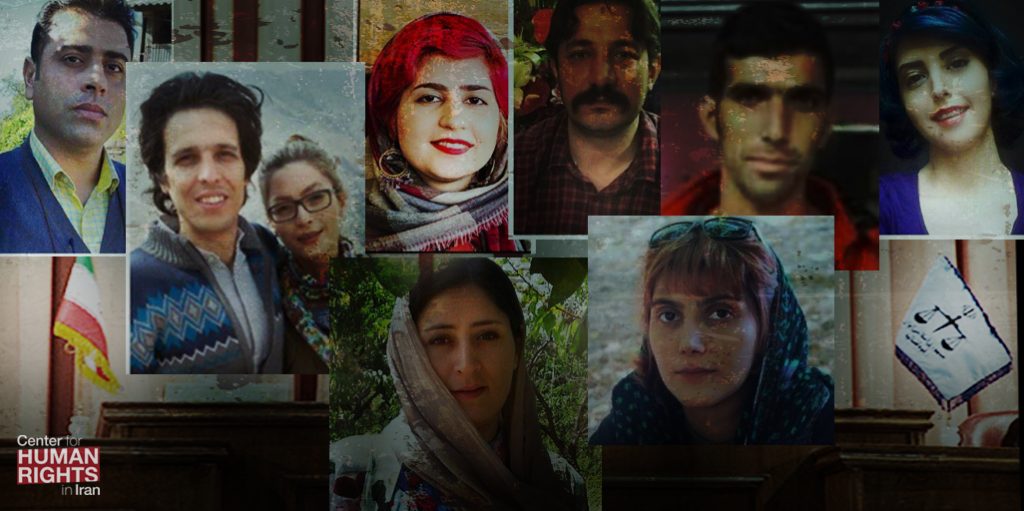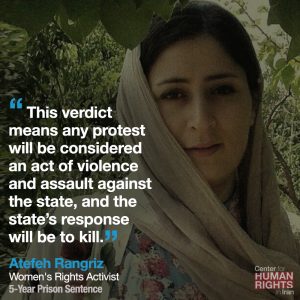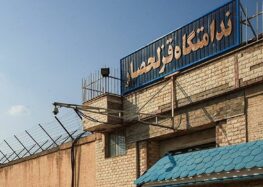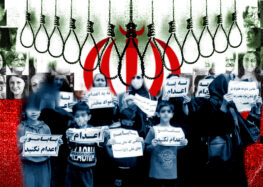“This Verdict Means Any Protest Will Be Considered an Act of Violence”

Nine Labor Rights Activists and Journalists Sentenced to Prison Without Right to Appeal
Judiciary Chief Ebrahim Raisi Eliminated Appeal Process with Supreme Leader’s Blessing
Nine labor activists were each sentenced to five years in prison on December 14, 2019, on the charge of “assembly and collusion against national security” at Branch 36 of the Appeals Court in Tehran without the opportunity to defend themselves, the Center for Human Rights in Iran (CHRI) has learned.
The Campaign for the Defense of Haft Tappeh Detainees (CDHTD) identified the defendants as Haft Tappeh sugar mill workers’ representatives Esmail Bakhshi and Mohammad Khanifar, activists Sepideh Qoliyan and Atefeh Rangriz, and journalists Amirhossein Mohammadifard, Sanaz Allahyari, Amir Amirgholi, Asal Mohammadi, and Marzieh Amiri.
“What this verdict says is, ‘We can and will choke you,’” wrote Rangriz in response to the court’s decision.
Referring to the more than 304 people who died amid the state’s crackdown on November’s street protests she added: “This verdict means any protest will be considered an act of violence and assault against the state and the state’s response will be to kill. This verdict means any talk about the circumstances of life and demanding change must be suppressed. This verdict means they will aim bullets at the people to kill in the name of the people. This verdict means confirmation of hundreds of deaths on the streets by the authorities without breaking a sweat. This verdict means that the judicial, executive and legislative branches have held our throat in their grips and pulled the trigger.”
In September 2019, the nine had been sentenced to prison terms of 18 to six years. Subsequently, they were denied the right to present a final defense before presiding Appeals Court Judge Ahmad Zargar, who issued their sentences with the defendants in absentia.
 “Senior judiciary officials had promised a fair resolution to this and similar cases but once again, judicial procedures… have been blatantly violated,” wrote Bakhshi and Khanifar’s attorney Farzaneh Zilabi.
“Senior judiciary officials had promised a fair resolution to this and similar cases but once again, judicial procedures… have been blatantly violated,” wrote Bakhshi and Khanifar’s attorney Farzaneh Zilabi.
“Based on Article 450 of the Criminal Procedures Regulations, the Appeals Court is required to hold hearings. However, the law… has been set aside on the orders of the Judiciary Chief [Ebrahim Raisi] with the consent of the Leader [Ali Khamenei],” she added.
Article 450 states, “The Appeals Court should immediately set a time for a hearing and summon all sides whose presence is necessary for the case. All sides can be present in person or through their lawyer. The lawyer’s absence will not prevent the case from being adjudicated.”
Section 5 of Article 14 of the International Covenant on Civil and Political Rights, to which Iran is a party, also states, “Everyone convicted of a crime shall have the right to his conviction and sentence being reviewed by a higher tribunal according to law.”
Yet in May 2019, newly appointed Judiciary Chief Ebrahim Raisi announced that the appeals process in Iran had been turned into a “confirmation” process,” which violates Iran’s Constitution and Criminal Procedures Regulations.
“We believe that our colleagues in the police, security and court system should carry out their investigations and procedures as if there is no appeal process,” Raisi said. “The preliminary court should be so precise and persuasive in its decisions that the Appeals Court should actually be a Confirmation Court that only ensures that the will of God and rights of the people are attained.”
The labor rights activist turned prisoner of conscience Sepideh Qoliyan tweeted: “The presiding judge told me that the Appeals Court no longer holds hearings but Mr. Raisi [made an exception] for the Haft Tappeh case and ordered the court to convene. However, not only did the court refuse to convene, but also the judge issued … verdicts that made the authorities look more disgraceful than they already had in the face of justice.”
“I believe these verdicts are completely unlawful… We will continue to object to them by all means possible,” she added.
Qoliyan’s attorney, Jamal Heydarinia told the Iranian Labor News Agency (ILNA) that he would file a petition with the Supreme Court for a judicial review of the sentence against his client.
Mohammadifard, who was the editor-in-chief of Gam labor affairs news channel on the Telegram messaging app at the time of his arrest, responded to the five-year sentence by tweeting, “The judiciary’s motto of fairness is very sweet but for us it tasted bitter. [We were convicted] because we are workers. Because we were the voice of wage earners. The weight of injustice on the innocent is very heavy.”
Read this article in Persian.






